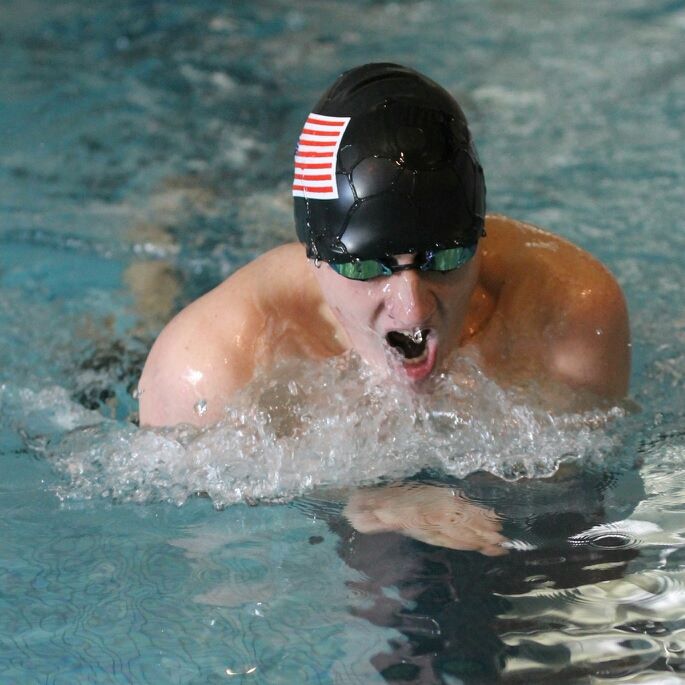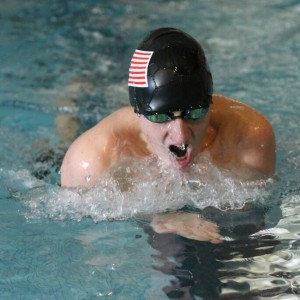
By Tom Rohrer
 Long before competing in international competitions and obtaining national records, Tyler Sharp recognized his passion for the water.
Long before competing in international competitions and obtaining national records, Tyler Sharp recognized his passion for the water.
“When we would go to a lake and jump in, all of my friends would get out after a bit,” said Sharp, a graduate of Capital High School. “And I would just stay in and swim for hours and hours. I guess I’ve always loved the water.”
That love for swimming has carried Sharp into a competitive swimming pool, where the 18-year-old has his eyes set on competing on the world’s biggest athletic stage.
Born with a shortened left arm that does not extend far past the elbow, Sharp is enrolled in the U.S. Paralympics Resident Swimming Program at the U.S. Olympic Training Center in Colorado Springs.
Sharp, who arrived at the training center this past August, will continue training in Colorado Springs up until the 2016 Paralympic Games in Rio, Brazil.

“(Qualifying for) Rio, that’s pretty much the goal right now, after that we will see,” said Sharp in a phone interview with ThurstonTalk.com. “It’s still a ways a way and I’m still new to the sport, so I’m dropping time like crazy. I think it’s a very realistic goal for me.”
Though he grew up participating in athletic activities such as soccer, baseball, skiing, golf and recreational swimming, Sharp first took part in competitive swim races during his junior year in high school.
Sharp competed for both the Evergreen Swim Club and the CHS boys’ team prior to his current run for the U.S.
“I’ve always played soccer, both my older brothers played soccer and I always wanted to become big in sports,” said Sharp, who also played the tuba for the CHS marching band. “When I realized that soccer didn’t have the potential, I looked to swimming.”
In the summer before his senior year, Sharp competed in his first international competition, the 2012 Speedo Can-Am Para-Swimming Championships in Winnipeg, Canada. Sharp finished third in the 50m and 100m freestyle, 200m individual medley and 200m breaststroke to go along with a fourth and fifth place finish in the 100m freestyle and 100m breaststroke respectively.
Prior to the Speedo Can-Am, Sharp got in contact with Kiko Van Zandt, the head coach of Shadow Seals Swimming, a swim club for the physically disabled in the Seattle area.
“I never trained with them, but (Van Zandt) told me about the Can-Am, and she knew my times were good enough to compete,” Sharp said.
Van Zandt would coach Sharp at his initial international competition, which laid the foundation for his future with U.S. Swimming.
In 2013, at the Spring Speedo Can-Am, Sharp posted fourth place in the 50m backstroke, fifth place in the 50m butterfly and 200m individual medley, sixth place in the 100m butterfly, and eighth place in 100m freestyle and 100m backstroke. Currently, Sharp holds the U.S. record within his class (S9) for the 200 breast stroke on a short course.
“It was mind boggling how far I still had to go but how far I had come in such a short time,” said Sharp about his first international competitions. “It opened my eyes to what I could do but what I still needed to work on.”
For his performances at the 2012-13 Can-Am Championships, Sharp earned his spot within the training program at Colorado Springs. The switch from high school club and scholastic competition to a national training regimen has been eye opening for the Olympia native.
“It’s completely different. In Olympia you’re more on your own and you have to push yourself,” said Sharp, whose older brothers Chris and Steven also graduated from Capital High School. “Here, you have to push yourself more and you’re getting instructed every day. You have to be on your game 24/7.”
Sharp went into detail regarding his daily schedule, which, as expected, is extremely demanding and starts the night before.
Schedule MWF:
10:30 p.m.: Snack before bed
6:25 a.m.: Wake up for two hours of pool work
8:30 a.m.: Breakfast
2 p.m.: Weigh lifting for an hour
3:30 p.m.: Two hours of pool work
At the U.S. Olympic Training Center, Sharp receives a majority of his instruction from Dave Denniston, a one-time world record holder, NCAA national champion and Olympic trial participant.
Following a sledding accident in 2005, Denniston is paralyzed from the waist down. Despite the injury, he competed for the U.S. Paralympic team at the 2008 Paralympic Games in China.
“We have different coaches, but (Denniston) is the one that will make me great,” said Sharp. “He will be the one to get me to the next level.”
Asked what he works with Denniston to improve on most, Sharp is quick to give a very broad, but very appropriate answer.
“Since I’m still new, I have all the bad habits. It will take my dedication to use better technique, get stronger and just better overall at everything,” Sharp said.
Prior to a race, Sharp will rely on visualization and his extensive training in order to deliver the best possible performance.
“Right at the block, I zone out and go into what I call robot mode. You’re always training for what you will do in the race, so when race-time comes, I’m not thinking, I’m just swimming,” said Sharp.
Being able to deliver a worthy performance at a high level meet is a joyous culmination for Sharp, as he knows how much work it took to get to that position.
“We take a month or two working on one single thing to improve on, so when a meet comes and you perform, that’s a satisfying feeling,” said Sharp. “It’s a very nice feeling when you swim and know everything happened perfectly and you didn’t happen to think about it.”
Sharp is in his current position due in large part to his athletic talent and personal drive for improvement. However, the teenage swimming sensation knows that without the support of his family, he wouldn’t be training in Colorado Springs today.
“I just think that having support from my parents and family has been as important as anything,” said Sharp, the son of Jeff and Tawni. “Even with my disability, (my parents) said I could do anything I wanted. They never put into my head that I couldn’t do anything. I could do whatever I wanted to do, and that was always something involved with sports.”
The Sharps were able to travel to Winnipeg for Tyler’s first appearance in the Can-Am Championship and will also be present when Tyler hits the pool for the 2014 version in Miami this March.
“Having that support, it means everything,” said Sharp. “It was special to share those moments with them.”
Armed with the support of his family, the instruction and structure from U.S. Swimming and his own drive for excellence, Tyler Sharp has the opportunity to be a part of the every growing Paralympic movement.
“It’s something people are becoming more aware of but at the same time, there are people who still don’t know what it is or the training behind it,” said Sharp. “I just like spreading that awareness and highlighting that athletes do train for the games and have a lot of passion for competing and winning. I’m happy with the direction it’s heading in because we just signed a contract with NBC and they will air the games live on television.”
While he is still years away from having the opportunity to compete in Rio, Sharp knows he has a golden opportunity every single day he hits the pool.
“I’m still scratching the surface of my ability and I’m fortunate enough to be in a position to maximize that ability,” Said Sharp. “I’m going to stay active, stay focused and work hard.”
For more information on Tyler Sharp, click here.



















































